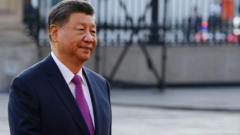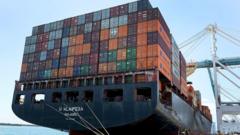As the U.S. ramps up tariff threats, China displays unwavering commitment to resist economic capitulation, raising global economic concerns.
China Stands Firm Against Escalating Tariff War with the U.S.

China Stands Firm Against Escalating Tariff War with the U.S.
Beijing's resolve strengthens as trade tensions between two superpowers escalate.
The ongoing trade confrontation between the U.S. and China has intensified, with President Donald Trump threatening to nearly double tariffs on Chinese imports, which could reach a staggering 104%. These tariffs threaten to affect a wide array of goods, from electronics to essential components, and Beijing has countered with its own retaliatory measures. Notably, experts predict a long-term economic fallout as both nations stand firm in their positions.
Chinese leader Xi Jinping has signaled no intention to back down. Following Trump's threats, Beijing's officials declared their determination to "fight to the end," indicating a willingness to endure significant economic pain rather than appear weak. "It is illogical to assume China will relent and lift tariffs unilaterally," remarked Alfredo Montufar-Helu from The Conference Board. The urgency of the situation is palpable, with new tariffs anticipated to take effect imminently, leaving countries and investors to grapple with the unpredictable economic landscape.
Market repercussions were immediate, with global stock markets fluctuating as uncertainty reigns. Asian markets experienced significant downturns, though some recovery was noted amidst optimism regarding potential US-Japan negotiations. Still, the looming U.S.-China tariff battle remains a wildfire concern for the international community. Commenting on the standoff, trade expert Mary Lovely characterized it as a contest of endurance rather than a pursuit of mutual benefits.
Although China's economy shows signs of strain from external pressures, its strategies include allowing the yuan to devalue, thus making its exports more competitive. With export-dependent revenue at stake, the stakes are higher than ever. Both nations depend heavily on each other for trade, complicating the feasibility of finding quick alternatives for the goods typically transacted between them.
The question now hangs over the global economy: how will this trade war evolve? Insights from economists suggest a variety of potential retaliatory tools remain at China's disposal, from deepening currency depreciation to various regulatory pressures against U.S. companies operating within its borders. While the stage may seem set for renewed private discussions between the two superpowers, the urgency of the situation leaves analysts divided about any possible reconciliation.
As this trade battle continues to unfold, one thing is clear: the implications will not just be confined to China and the U.S., but will have far-reaching effects around the world, reshaping trade dynamics in unprecedented ways.






















